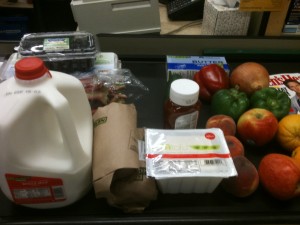Almost nobody likes to read about nutrition, but we all should. And most of us think we eat healthy, and even more of us believe we know what healthy eating habits are and what we need to improve upon.
But how many of you really confront what you eat? How many stick with logging your daily intake?
I have trained enough people over the years that I feel confident in telling new members that if they want to lose weight they must start logging their food. Not doing so is a big signal that this person is not yet ready to face themselves.
Those that hold themselves accountable lose fat, those that don’t probably won’t. It’s simple.
But that doesn’t mean it’s easy. What we eat is tied in with our lifestyle, social life, work environment, and cultural background and beliefs. And some of those issues are far too complex to get into on a blog post, but what I can do is encourage the use of simple nutritional strategies that in time can elicit enough of a change so as to create positive body composition changes.
When a person starts to see changes for the better it often serves as encouragement to continue to improve eating habits and activity levels.
When you feel better you likely look better, and when you look better you feel like moving more.
I’ve had a number of clients over the years that were slow starters, but once they got going found themselves wanting to try new sports or activities, or even taking up hobbies they hadn’t done in decades.
Positive changes only encourage more, which is why EFL is going an extra step and providing all members with nutritional support.
Galya and Roland Denzel were kind enough to work with us to create three nutritional brochures that address related nutrition topics in a concise yet precise manner. Both have a wealth of experience guiding others but also dealing with food and weight issues themselves, and I can tell you they walk the walk. But they also don’t pretend to never enjoy food and drink, which is why I trust their advice as being practical and based on science and experience.
One smart thing they do is encourage ways to make little changes in shopping and eating habits. Nothing radical, no diets.
Their meal construction guide is a perfect example. Many people are confused about what foods are good sources of proteins, and which are good sources of fats. Roland and Galya put together a mix and match grid of options, but also simple guidelines on which to generally have more or less of.
One nugget of gold:
Many protein sources also contain fat. Fat is healthy and necessary for good health, but the fattier your protein source is, the less fat you need to add in cooking and via the “fats” category.
Simple, yet something most of us myself included don’t often consider when cooking.
Now to take that first step to a healthier body…
ShareMAY


About the Author:
Owner of Elemental Fitness Lab in Portland, OR. Our approach to training is to integrate research (I'm an NSCA CSCS, certified Functional Movement Screen, and Precision Nutrition) with practical experience. I've studied martial arts in Japan and the U.S. for many years, and have put in my time in the gym, in the water, on the snow, on the rock wall, and on the bike.